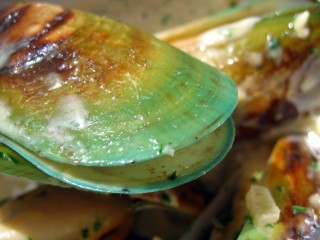Marine Oil Supplement Has Positive Effects on Post-Exercise Muscle Damage

Pharmalink New Zealand green-lipped mussel
The study, by kinesiology professor Timothy Mickleborough at the IU School of Public Health-Bloomington, found that taking a pre-exercise supplement of the omega-3 PCSO-524, a marine oil lipid derived from the New Zealand green-lipped mussel, has significant positive effects on post-exercise muscle damage.
The pharmaceutical name of the supplement is Lyprinol, or Omega XL in the United States, and it has previously been used to effectively reduce the effects of osteoarthritis, rheumatoid arthritis, inflammatory bowel disease and exercise-induced asthma. Pharmalink International LTD, which funded the study, develops it.
Mickleborough said his initial study of this particular marine oil supplement led him to further test its healing properties on other parts of the body.
“I've worked with Pharmalink before when they approached me to do a study with this particular oil and its effects on exercise-induced asthma and respiratory inflammation,” Mickleborough said. “I thought if it can be used as an anti-inflammatory for lungs, perhaps it could reverse muscle inflammation as well.”
For the study, lead author Mickleborough and his colleagues tested 32 “untrained male subjects” — men who exercise less than three times a week for less than 30 minutes at a time — who would elicit a greater muscle response than an athlete who is used to regular muscle damage. The subjects were randomly given either the marine oil supplement or a placebo for 26 days before a muscle-damaging exercise session and for 96 hours afterwards.
The exercise session consisted of running at fairly high intensity for 20 minutes downhill on a treadmill. The body's reaction to the muscle-damaging exercise regimen was tested immediately, and at 24, 48, 72 and 96 hours post-workout.
The men who were given the PCSO-524 marine oil supplement exhibited less muscle soreness, less muscle pain, less strength loss, less fatigue and even less inflammatory proteins evident in their bloodstreams. Overall, they experienced less bodily stress after their workout in comparison to the subjects who were given the placebo.
For people who are looking to start exercising again, or even for those who engage in intense workouts regularly, this discovery can have a variety of positive effects on how their bodies react to muscle damage, Mickleborough said.
“It might have positive implications for triathletes if they're doing several different types of exercises, and it could potentially help diminish soreness in multisport, recreational athletes as well,” he said. “Essentially, for anyone who is engaging in unaccustomed exercise, it's a nice product.”
Mickleborough's study “The effects PCSO-524®, a patented marine oil lipid and omega-3 PUFA blend derived from the New Zealand green lipped mussel (Perna canaliculus), on indirect markers of muscle damage and inflammation after muscle damaging exercise in untrained men: a randomized, placebo controlled trial” is featured in the Feb. 2015 issue of the Journal of the International Society of Sports Nutrition.
Co-authors include Robert Chapman, assistant professor in the School of Public Health-Bloomington; Jacob Sinex, doctoral candidate in the School of Public Health-Bloomington; Molly Hirt, IU School of Medicine student; and David Platt, doctoral candidate at the University of Notre Dame.
The study was supported by a grant from Pharmalink International LTD, which manufactures and owns PCSO-524. The funder had no role in study design, data collection and analysis, in writing the journal article, or the decision to publish.
For a copy of the paper or to speak with Mickleborough, contact Milana Katic at mkatic@iu.edu or 812-855-0084.
Contact Information
Milana Katic
Visual and Digital Media Specialist
mkatic@iu.edu
Phone: 812-855-0084
Media Contact
All latest news from the category: Health and Medicine
This subject area encompasses research and studies in the field of human medicine.
Among the wide-ranging list of topics covered here are anesthesiology, anatomy, surgery, human genetics, hygiene and environmental medicine, internal medicine, neurology, pharmacology, physiology, urology and dental medicine.
Newest articles

NASA: Mystery of life’s handedness deepens
The mystery of why life uses molecules with specific orientations has deepened with a NASA-funded discovery that RNA — a key molecule thought to have potentially held the instructions for…

What are the effects of historic lithium mining on water quality?
Study reveals low levels of common contaminants but high levels of other elements in waters associated with an abandoned lithium mine. Lithium ore and mining waste from a historic lithium…

Quantum-inspired design boosts efficiency of heat-to-electricity conversion
Rice engineers take unconventional route to improving thermophotovoltaic systems. Researchers at Rice University have found a new way to improve a key element of thermophotovoltaic (TPV) systems, which convert heat…



